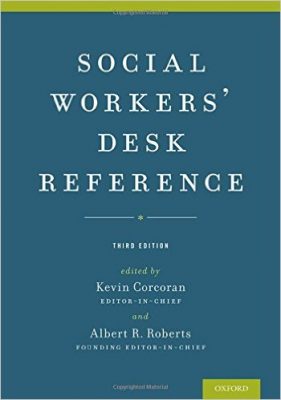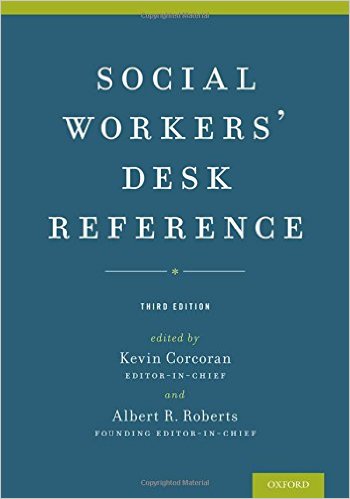 Editor-in-Chief: Kevin Corcoran, PhD;
Editor-in-Chief: Kevin Corcoran, PhD;
Founding Editor-in-Chief: Albert R. Roberts, PhD
Publisher: Oxford University Press – 1,438 pages
Book Review by: Sonu Chandiram
There are numerous large-scale problems the world over to which there are no easy solutions. Poverty, malnutrition, homelessness, lack of adequate physical and mental health care, and lack of access to quality education are some of the major ones, no doubt more prevalent in underdeveloped and developing countries, but also in poorer sections of the developed world.
Those involved in social work worldwide are certainly doing admirable work to ameliorate the situation for those afflicted with these and other problems. But like any field of endeavor wherein more success occurs when empowered with new knowledge and experience, so does social work. However, the dissemination of such knowledge is critical to more effective social work. That is what this book does.
A massive compendium of more than 1400 pages, this important book represents the combined work not only of the two editors named above and 10 section editors, but also of 180 contributing authors. Together, this third edition discusses numerous social work topics in 160 chapters, and we provide you an overview of its extensive coverage by listing its 15 Parts below:
- Overview and Introduction to Social Work
- Rules, Functions, and Fields of Social Work Practice
- Social Work Values, Ethics, and Licensing Standards
- Theoretical Foundations and Treatment Approaches in Clinical Social Work
- Assessment in Social Work Practice: Knowledge and Skills
- Working With Couples and Families
- Developing and Implementing Treatment Plans with Specific Groups, Disorders
- Guidelines for Specific Techniques
- Guidelines for Specific Interventions
- Case Management Guidelines
- Community Practice
- Working with Vulnerable Populations and Persons at Risk
- School Social Work
- Forensic Social Work
- Evidence-Based Practice
The first edition of this book when released in 2002 was hailed as a comprehensive resource and reference on social work. It was written to help social work practitioners, students, researchers, and others involved in this profession in one way or another, do their work better. That mission continued with updates in its second edition, and goes on with this current (2015) edition.
Elizabeth Clark discusses in chapter 1, What Changes and What Remains in a Practice Profession, what has changed in the political and economic landscape of the United States since the second edition of this book was published six years ago. She points out that the numbers of baby boomers, homeless people, prisoners, and veterans have increased. Global warming and natural disasters are on the rise as well. Work on health care has been initiated, but immigration reform has ‘stalled’ with more partisan political wrangling.
Social and economic problems, lack of access to resources, and income disparities are prevalent worldwide. As a consequence, “social work has become a ‘global profession,” with a “moral mandate that crosses geographic boundaries,” Clark points out.
“Social work principles of human rights and social justice underlie the efforts of our social work colleagues in both developed and developing countries,” she writes. Clark informs us also that the over 200 members of the International Federation of Social Workers (IFSW), in partnership with other global organizations, have developed A Global Agenda for Social Work and Social Development, with focus on four areas:
- Promoting social and economic equalities
- Promoting dignity and worth of people
- Working toward environmental sustainability
- Strengthening recognition of the importance of human relationships
Information relating to this can be found on: http://cdn.ifsw.org/assets/globalagenda2012.pdf
Each chapter of this book provides a wealth of information with discussions of numerous topics and subtopics, bullet-point items, tables, and lists of references and websites for further study.
This is a valuable resource for social work professionals and others involved in this field. It is extensive and authoritative.
Editors:
Editor-in-Chief:
Kevin Corcoran, PhD is Professor of Social Work at the University of Alabama. He holds a BA in English literature from Colorado State University, an MA in counseling from the University of Colorado – Colorado Springs, an MSW and PhD from the University of Pittsburgh, and a JD from the University of Houston. He has published over 130 journal articles and book chapters, and has authored or edited 15 books.
Founding Editor-in-Chief:
Albert R. Roberts, PhD was Professor of Social Work and Criminal Justice and Director of Faculty and Curriculum Development in the Faculty of Arts and Sciences at Rutgers University. He was the Founding Editor-in-Chief of the Brief Treatment and Crisis Intervention journal and the Victims and Offenders journal.
He was a member of the Board of Scientific and Professional Advisors, a Board-Certified Expert in Traumatic Stress for the American Academy of Experts in Traumatic Stress, and a Diplomate of the American College of Forensic Examiners. He authored, co-authored, or edited about 250 scholarly publications, including numerous peer-reviewed journal articles and book chapters, and 38 books.







